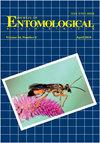胸腺精油对柑橘平球菌(半翅目:假球虫科)及其球虫捕食者蒙氏隐蝇的致死毒性研究
IF 0.7
4区 农林科学
Q4 ENTOMOLOGY
引用次数: 3
摘要
摘要植物提取物,包括精油,是用于害虫防治的合成杀虫剂的有前景的替代品。在这项研究中,我们评估了从胸腺(L.)Hoffmann提取的精油的熏蒸毒性在实验室条件下对抗柑橘粉蚧,柠檬扁球菌(半翅目:拟球虫科)及其球虫捕食者Cryptolaemus montrouzieri Mulsant(鞘翅目:球虫科。气相色谱-质谱分析表明,从T.capitatus中鉴定出的主要化学化合物是香芹酚(65.15%),其次是对伞油梅烯(11.79%)和γ萜品烯(7.48%)。当暴露于测试的精油时,p.citri幼虫(高达100%)和成虫(高达96%)的死亡率较高。citri成虫的致死浓度中值高于幼虫。以10和20µL/Lair施用的头胸腺精油对C.montrouzieri成虫显示出高毒性。这些结果突出表明,T.capitatus精油是在突尼斯控制P.citri的一种有前景的工具。然而,应该考虑这种油对C.montrouzieri的不利影响,以增强其在害虫综合管理中的实际意义。本文章由计算机程序翻译,如有差异,请以英文原文为准。
Lethal Toxicity of Thymus capitatus Essential Oil Against Planococcus citri (Hemiptera: Pseudococcidae) and its Coccinellid Predator Cryptolaemus montrouzieri (Coleoptera: Coccinellidae)
Abstract Botanical extracts, including essential oils, are promising alternatives to synthetic insecticides for pest control. In this study, we evaluated the fumigant toxicity of an essential oil extracted from Thymus capitatus (L.) Hoffmanns. & Link against the citrus mealybug, Planococcus citri Risso (Hemiptera: Pseudococcidae), and its coccinellid predator Cryptolaemus montrouzieri Mulsant (Coleoptera: Coccinellidae) under laboratory conditions. Gas chromatography–mass spectrometry analysis indicated that the major chemical compounds identified from T. capitatus were carvacrol (65.15%), followed by p-cymene (11.79%) and γterpinene (7.48%). High mortality levels were registered for P. citri larvae (up to 100%) and adults (up to 96%) when exposed to the tested essential oil. The median lethal concentration values calculated for P. citri adults were higher than for larvae. Thymus capitatus essential oil applied at 10 and 20 µL/Lair showed high toxicity towards C. montrouzieri adults. These results highlighted the efficacy of T. capitatus essential oil as a promising tool to control P. citri in Tunisia. However, the adverse effects of this oil towards C. montrouzieri should be taken into consideration to enhance its practical implication in integrated pest management.
求助全文
通过发布文献求助,成功后即可免费获取论文全文。
去求助
来源期刊
CiteScore
1.20
自引率
11.10%
发文量
40
审稿时长
>12 weeks
期刊介绍:
The Journal of Entomological Science (ISSN 0749-8004) is a peer-reviewed, scholarly journal that is published quarterly (January, April, July, and October) under the auspices of the Georgia Entomological Society in concert with Allen Press (Lawrence, Kansas). Manuscripts deemed acceptable for publication in the Journal report original research with insects and related arthropods or literature reviews offering foundations to innovative directions in entomological research

 求助内容:
求助内容: 应助结果提醒方式:
应助结果提醒方式:


